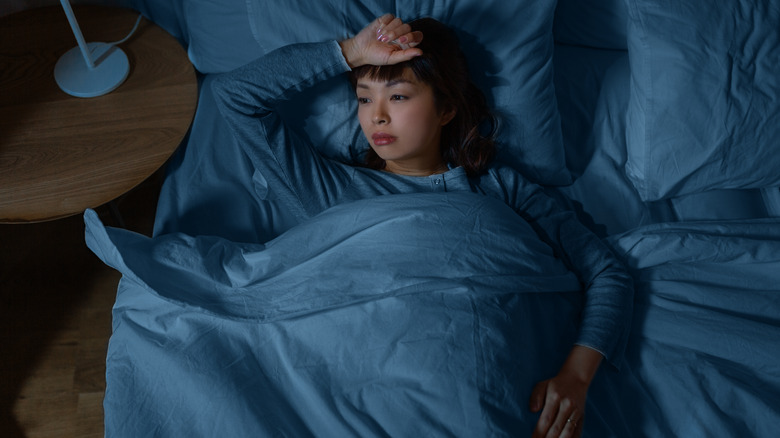What Happens To Your Sleep When You Stop Drinking Coffee
While we want coffee to keep our minds and bodies buzzing during the day, it's the last thing we want come nighttime. Because caffeine is a stimulant, it activates the brain and nervous system and keeps the flow of adrenaline and cortisol going strong throughout the bloodstream (via the BetterHealth Channel). This may improve attention, boost alertness, and give us a quick burst of energy when we need it, but it can also keep us wide awake at bedtime staring into the abyss as the minutes tick by, especially if you're drinking coffee right before bedtime.
The reason coffee can make sleep difficult is because caffeine interferes with the daytime accumulation of a chemical in the brain known as adenosine (via Sleep Foundation). The higher the levels of adenosine in the brain by the end of the day, the more tired you get at night. Thus, if you kick your coffee habit to the curb, a better night's sleep must be on the horizon, right? Perhaps not immediately, though. Experts say that it may be a bit of a bumpy road at first.
Cutting out coffee can mess with your sleep cycle
The more coffee you drink, the harder this transition may be. According to a 2023 survey issued by Statista, nearly 80% of daily coffee-drinkers reported consuming two or more cups of coffee while at home during the work week. For people with a higher coffee intake, abruptly cutting themselves off can lead to disruptions in their sleep cycles, reports Prevention.
Your natural sleep cycle shifts between rapid eye movement (REM) and non-rapid eye movement (NREM) sleep. The majority of the night is spent in NREM sleep, during which many of your autonomic functions slow, such as heart rate and respiration (via Sleep Doctor). It's during REM sleep when these functions pick up the pace and where dreaming is predominantly thought to take place. Your sleep cycle may repeat itself as many as five or six times nightly. For die-hard coffee fans, however, these sleep disturbances can take the form of insomnia, one of many potential symptoms of caffeine withdrawal.
Try reducing your coffee intake a little more each week
While some people may experience symptoms of insomnia soon after they stop drinking coffee, experts at Addiction Resource also note that insomnia often develops during the latter half of the withdrawal period. Eventually, symptoms will subside, but Prevention reports that it may take seven to 14 days for one's sleep cycle to even out again after a person quits coffee. After this time, you may begin to notice improvements in sleep.
To help the process go more smoothly, Whitney Sleep Center suggests gradually reducing the amount of coffee you're drinking over several weeks until you're down to zero. For example, try lowering your coffee intake by 50% during week one, then decrease it by half again in week two, and so on and so forth. This way, you can reduce the chances of experiencing caffeine withdrawal, which can also involve headaches, nausea, brain fog, muscle pain, constipation, and daytime sleepiness.



